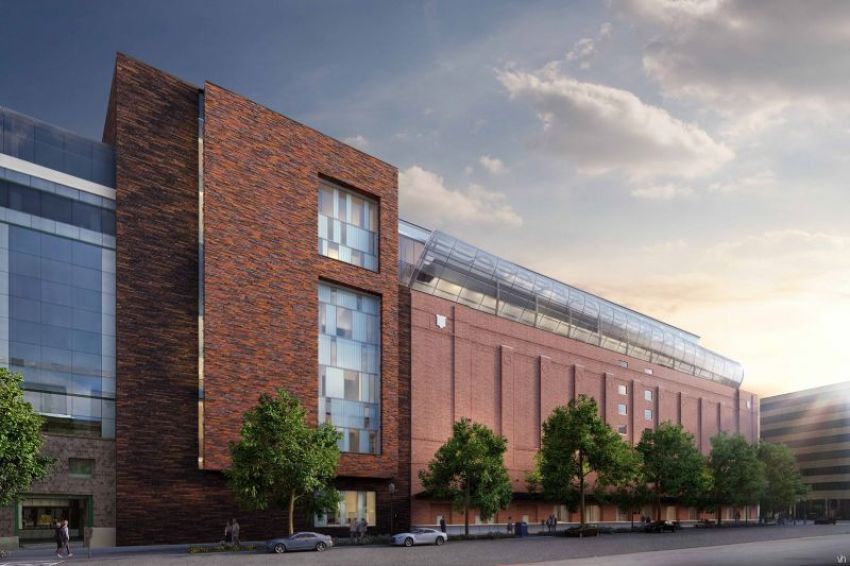Museum of the Bible Reveals $42 Million High Tech Experience Ahead of Opening

WASHINGTON — The Museum of the Bible plans to offer visitors an unparalleled Bible experience with a $42 million investment in state-of-the art technology that will redefine the concept of a museum.
A hard hat technology tour of the 430,000-square-foot museum in progress on Nov. 17 marked one year to the day that the institution will open its doors to visitors for an immersive Bible experience.
With over 500 construction workers on-site daily, the museum is on time and under its $500 million budget, organizers say.
"For us to be in Washington, D.C. no matter how great or successful we are here — and we pray that that will be the case — there's still a world out there that we'd like to present this material to when it comes out of this box, as we refer to it, to the global market and to have creative electronic capacity to do that," Museum of the Bible President Cary Summers said last month to a room full of dignitaries during the tour that was attended by The Christian Post.
Summers said the museum's vision statement calls for a global, innovative and educational institution that helps engage individuals with the Bible by learning about its history, narrative and impact.
Designers have created a sensory environment that makes use of the edifice in unexpected ways, starting with the moment guests step into the museum's lobby.
When patrons enter they will be greeted by a dramatic 140-foot arcade ceiling with 555 LED panels that show images from the museum's collection.
The museum's total infrastructure and guest interface are comprised of 384 monitors, 93 projectors, 83 interactive elements and 12 theaters.
Instead of the traditional docent who controls the pace of a tour, Museum of the Bible guests can experience exhibits using a customized mobile device, the size of a large smart phone, as they travel a chosen route through the museum's digital guide system with personalized commentary available in 10 languages. This innovation is expected to become the new standard in museum navigation.
Once a guest purchases a ticket at the museum or pre-orders one online, their ticket record is synced with the handheld device.
Perhaps one of the museum's technological highlights is its use of electronic touch tables that can sense patrons as they approach with their handheld device and respond to the touch of a hand or by placing a handheld device on the table.
The museum boasts an impressive 472-seat performing arts hall that uses 360-degee projection mapping to give guests a sense of total visual immersion. Projection mapping on the face and sides of an interior space is unprecedented, say museum planners, marking another of the institution's innovations.
These electronic feats are made possible by 200 miles of low-voltage electrical cables. The cables are cleverly installed to provide easy access for future upgrades or maintenance, and give the institution what Summers calls "electronic capacity."
The cables are covered by a subfloor of removable steel squares. Magnetic planks, resembling a traditional hardwood floor, overlay the steel subfloor. The planks can be lifted to expose the steel plates, which are removed to access the cables.
In an exclusive interview with CP, Museum of the Bible Vice President Jeff Schneider said that museum adaptations and upgrades won't be just about technology.
"We'll be constantly keeping the content fresh," he said. "We actually have hundreds of scholars that work with us on our content to keep it fresh and relevant because we have areas that [involve] the impact of the Bible — the Bible's impacting the world everyday."
Schneider added, "On the technology side, we actually built all the infrastructure [with] 'future proofing' with the type of cabling that we use. So [regarding] the fiber optic lines we left extra channels. We made it so that we can easily take up [remove] floors. So everything can be swapped out knowing that the shelf life of technology is about three years, and we want this to always be relevant. So that was in our strategy from the get-go."
Another feature of the museum is the structure's biblical garden rooftop, which provides a picturesque panoramic view of Washington's major landmarks, including the Capitol, Washington Monument, National Museum of the American Indian, the Smithsonian Institution, and the Botanical Gardens.
A portion of the sixth floor rooftop will be covered by a curving glass enclosure that is veiled by a special net applique designed to "bounce away" the sun's intense rays in a process known as "fricking."
Rounding out the top floor will be an elegant ballroom that seats 1,000 for lectures and 500 for dinner, making it an ideal destination for special gatherings.
The Museum of the Bible opens Nov. 17, 2017.



























